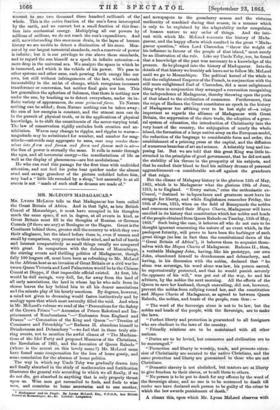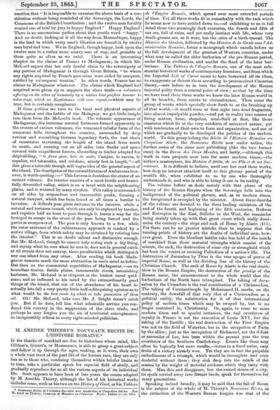MR. McLEOD'S MADAGASCAR*
MR. LYONS McLzor• tells us that Madagascar has been called the Great Britain of Africa. And in that light, as late British Consul of Mozambique, it must have occupied in his thoughts much the same space, if not in degree, at all events in kind, as Great Britain must fill in the thoughts of Russian or German Consuls (if there are any) at l3oulogne or the Hague. Great is the Continent behind them, greater still the country to which they owe their allegiance, but the island before them is, even if unseen and small by comparison, very present to their mind, and as full of bustle and interest comparatively as small things usually are compared with great. In comparison with the dulness of Mozambique, the stirring events and thrilling politics of Madagascar, though fully 100 leagues off, must have been as refreshing to Mr. McLeod in the African heat as an invasion of Great Britain or a civil war be- tween Queen Victoria and Lord Palmerston would be to the Chinese Consul at Dieppe, if that impossible official existed. At first, life would be dull enough, very dull, far, far away from the land of all early associations, the land in whose lap he who sails from its shores leaves the key behindd, him to all his dearer associations and the minute play of his hourly emotions. By degrees, however, a mind not given to dreaming would fasten instinctively and by analogy upon that which most naturally filled the void. And when in Mr. McLeod's volume we read of the," Precautions for the Safety of the Crown Prince"—" Accession of Prince Rakotond and Im- prisonment of Rambosalama "—" Embassies from England and France" --" Coronation of the King and Queen "—" Treaties of Commerce and Friendship"—" Radama II. abandons himself to Drunkenness and Debauchery "—we feel that in these truly stir- ring events, not to mention the awful climax of "The Machina- tions of the Idol Party and proposed Massacre of the Christians, the Revolution of 1863, and the Accession of Queen Rabodo" (where is the accent on this lovely name ?) Mr. McLeod must have found some compensation for the loss of home gossip, and some consolation for the absence of home polities.
The way in Which my Uncle Toby was gradually drawn into and finally absorbed in the study of mathematics and fortification illustrates the general rule according to which we all finally, if we do not die, get absorbed in anything that is only properly thrust upon us. Wise men get reconciled to fools, and fools to wise men, and countries to home secretaries and to one another,
• Xa&linnear and sts Peopk. B Lyons McLeod, Esq., F.P.G.&, Lie British Consul at MosamInclue, Sc, Sc. London: Longman:I. and newspapers to the gooseberry season and the virtuous mediocrity of mankind during that season, in a manner which_ is only to be explained by the adaptability under compulsion. of human nature to any order of things. And the inte- rest with which Mr. McLeod recounts the history of Mada- gascar, and the happy effects which resulted in the great "Mada- gascar question," when Lord Clarendon "threw the weight of his influence in favour of the people of that island," must surely be an illustration of the rule. Like my Uncle Toby, too, he found. that a knowledge of the past was necessary to a knowledge of the present. So he plunged into the history of Madagascar. Into the details of that history we humbly ask leave not to follow Mr. McLeod until we go to Mozambique. The political kernel of the whole ia that the enlightened Emperor of the French, in conjunction with the still more enlightened Earl of Clarendon, did a most enlightened. thing when in conjunction they arranged a convention recognizing the independence of Madagascar, thereby throwing open the ports of that island to the civilization of commerce. Furthermore, that the reign of Radama the Great constitutes an epoch in the history of Madagascar too stliking ever to be lost sight of—a reign important as regards the alliance of Madagascar with Great Britain, the suppression of the slave trade, the adoption of a gene- ral system of education, the introduction of Christianity into the very heart of the country, the subjugation of nearly the whole island, the formation of a large native army on the European model, the reduction of the language to considerable form and order, the establishment of a printing press at the capital, and the diffusion of numerous branches of art and science. A tolerably long and im- posing list. But we are told that this great King was little in- structed in the principles of good government, that he did not seek the stability of his throne in the prosperity of his subjects, and that he sucked their blood to feed his military dreams of personal aggrandizement—a considerable set-off against the grandeura of that reign.
But the climax of Malagasy history is the glorious 12th of May, 1863, which is to Madagascar what the glorious 19th of June, 1215, is to England. "Every nation," cries the enthusiastic ex- Consul, "destined to independence and greatness must have its struggle for liberty, and while Englishmen remember Friday, the 19th of June, 1215, when on the field of Runnymede the nobles and commons secured their Magna Charta, Madagascar will have enrolled in its history that constitution which her nobles and heads of the people obtained from Queen Rabodo on Tuesday, 12th of May, 1863." Such being the case, it behoves all who do not care to be thought ignorant concerning the nature of an event which, in the paulopost futurity, will prove to have been the harbinger of such great things (no less in fact than the constitutional dawn of the "Great Britain of Africa"), it behoves them to acquaint them- selves with the Magna Charta of Madagascar. Radama IL, then, a veritable Malagasy John, having, like his prototype, our own John, abandoned himself to drunkenness and debauchery, and. having, in his discussion with the nobles, declared that "he alone was sovereign, his word alone was law, his person sacred, he supernaturally protected, and that he would punish severely the opposers of his will," was put out of the way, he and his advisers, by the nobles the next morning. All the efforts of the Queen to save her husband, though ,unavailing, did not, however, prevent the nobles from rallying round her, and the constitution and Magna Charta of Madagascar, as agreed to between Queen Rabodo, the nobles, and heads of the people, runs thus : —
"The word of the Sovereign alone is not to be law, but the nobles and heads of the people, with the Sovereign, are to make the laws.
"Perfect liberty and protection is guaranteed to all foreigners who are obedient to the laws of the country.
"Friendly relations are to be maintained with all other nations.
"Duties are to be levied, but commerce and civilization are to be encouraged."
"Protection and liberty to worship, teach, and promote exten- sion of Christianity are secured to the native Christians, and the same protection and liberty are guaranteed to those who are not Christians.
"Domestic slavery is not abolished, but masters are at liberty to give freedom to their slaves, or to sell them to others.
"No person is to be put to death for any offence by the word of the Sovereign alone, and no one is to be sentenced to death till twelve men have declared such person to be guilty of the crime to which the law awards punishment of death."
A climax this, upon which Mr. Lyons McLeod observes with
emotion that "It is impossible to examine the above basis of a con- stitution without being reminded of the Sovereign, the Lords, the Commons of the British Constitution ; and the twelve men forcibly remind one of trial by jury in happy England." Happy England ! There is an unconscious pathos about that gentle word "happy." And no doubt, looking at it all the way from Mozambique, happy is the land in which every man's liberties are fenced in by twelve men loyal and true. We in England, though happy, look upon the twelve men in a rather more scurvy sort of way, and grumble at them quite as often as we extol. There is an interesting chapter on the claims of France to Madagascar, in which Mr. McLeod argues that her only lawful claim to the sovereignty of any portion of Madagascar is through Great Britain, "to whom any rights acquired by French possession were ceded by conquest, ratified by subsequent treaties." In other words, France has no claims to Madagascar whatever. The claims which England had acquired were given up to suppress the slave trade—a volwatary offering on the altar of humanity by a nation that prefers honour to advantage which. no Englishman will ever regret,—which may be true, but is certainly complacent.
IL from politics we turn to the local and physical aspects of Madagascar and the habits of the Malagasy, we get little insight into them from Mr. McLeod's book. The volcanic appearance of Madagascar, the immense natural fortresses formed apparently in the craters of extinct volcanoes, the truncated tabular form of the numerous hills throughout the country, surrounded by deep ravines and resembling German legendary forts, the vast chain of mountains traversing the length of the island from north to south, and running out on all sides into flanks and spurs covered with magnificent forests, abounding in timber adapted for shipbuilding, "le faux gia,c, bole de natte, l'azigne, le saccoa, Ie copalier, red takamaka, and eolofane, ninety feet in length,"—all this gives a tolerable though still vague idea of the general aspect of the island. The description of the natural fortressof Arnbatouza how- ever, is worth quoting:—" This fortress is doubtless the crater of an extinct volcano. Its interior consists of a most fertile and beauti- fully diversified valley, which is on a level with the neighbouring plains, and is watered by many rivulets. This valley is surrounded on all sides by stupendous and inaccessible peaks, forming a natural rampart, which has been found at all times a barrier to invasion. A difficult pass gives entrance to the interior, while a natural and tortuous tunnel, which can only be explored by torches, and requires half an hour to pass through it, leaves a way for the besieged to escape in the event of the pass being forced and the garrisen overpowered. The pass is only- known to a few, while the outer entrance of the subterranean approach is masked by a native village, from which safety may be obtained by retiring into the interior." This is no doubt salient and distinctive enough. But Mr. McLeod, though he cannot help seeing such a big thing,
and saying what he sees when he sees it, does not in general catch, at all events doers not convey, those peculiarities which distinguish any one island from any other. After reading his book Mada- gascar remains much the same abstraction in one's mind as before. But then on the commercial capabilities of Madagascar,—on its boundless timber, fertile plains, innumerable rivers, astonishing harbburs, Mr. McLeod is as eloquent as the busiest naval quid- nunc, and so inflamed is his mind by the extraordinarily good things of the island, that out of the abundance of his heart he
actually lets fall a very pretty little half-soliloquizing opinionas to What would be the best route by which to take possession oy them
all. Oh! Mr. McLeod, take care Mr. J. Bright doesn't catch you. But if he does, tell him what admirable service you ren- dered this country in the suppressipir of the slave trade, and perhaps he may forgive you the sin of territorial concupiscence, so inexpressibly odious to every right-minded politician.































 Previous page
Previous page